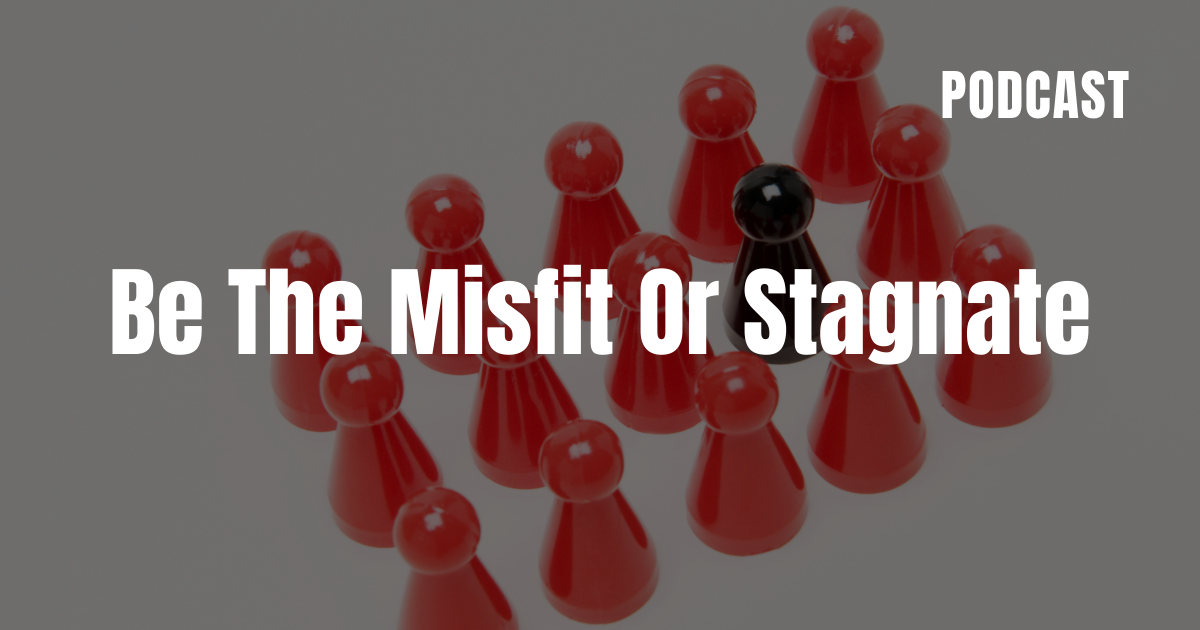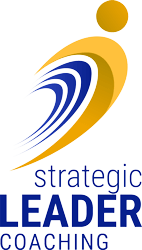“Be The Misfit Or Stagnate” Brief Summary of Show:
Are you a misfit in your workplace? Do you tend to swim up-stream? Do you question the status quo? In this Inspired Action for Imperfect Humans podcast episode Christopher Lawrence and Kyle Kalloo discuss being the misfit in the workplace, why it’s a good thing, how it can keep a business innovative and from stagnating.
Calls to Action:
Tell us your “inspired stories” stories by visiting www.InspiredActionPodcast.ca
Christopher Lawrence LinkedIn: https://www.linkedin.com/in/career-life-coach-christopher-lawrence/
Kyle Kalloo LinkedIn: https://www.linkedin.com/in/kyle-kalloo/
Change My Life Coaching & Strategic Leader LinkedIn: https://www.linkedin.com/company/6446498/admin/
Change My Life Coaching: https://changemylifecoaching.ca
Strategic Leader: https://strategicleader.ca
“Be The Misfit Or Stagnate” Transcript:
The more emotionally granular we can get, the more flexible our thinking is.
[Announcer] Is the thought of being imperfect keeping you from taking action? Welcome to Inspired Action for Imperfect Humans. Each week, we give you real life stories and thought provoking research that inspires your soul to live a more fulfilled life through your own actions. From the heart of Calgary, Canada, here are your hosts, award winning coaches, Christopher Lawrence and Kyle Kalloo.
Good morning, good morning, even if it’s the afternoon.
It’s morning somewhere is what you’re saying.
It’s morning for me right now. Kyle, I want you to tell me you’ve been in lots of organizations where you get into trouble. What’s the common denominator here? This is your intervention.
You know what’s interesting? As soon as you said that, I knew exactly what you’re talking about is I know I didn’t, I know I don’t think the same way, I don’t do well with the whole status quo thing, I just don’t. And it’s not because although people have told me, and people make comments about it, they see the interaction they have with me is like it’s deliberate. Like I’m deliberately trying to be argumentative. I’m deliberately trying to be combative. I’m deliberately trying to, and sometimes when policies in organizations just don’t make sense, or the common thing I often say is because it was done in 1812, they still think you need to do it today. And hey, hey, hey, there are things that is from 1812 that still make sense, and sure let’s do it, but not everything. And so I sometimes felt like I was the odd one out. It was a constant feeling that I was the odd person out because I just think it differently. I’m not saying it’s better than anyone else. I just thought differently about why we do what we do, especially when it comes to operations and people. That’s the two groups that I was just like, ah, ’cause sometimes operation is stomping all over people. Or sometimes people really mess up operations. And I’ll be honest with you, it has held me back in a couple of jobs. It has ’cause people would not promote me because they felt if I had more status in a certain organization, it would be deadly. Their words, not mine. Why do you ask?
Well, I’m just asking ’cause I think about this thing of, we’ve done a couple of podcasts where we talk about like innovation and thinking differently. And there’s research that’s come out about emotions. So in I’ve probably mentioned it a couple of times, but it’s because it’s struck me so deeply. You cannot bypass emotion unless you are not neuro-typical. Even people who say that they’re thinking objectively or they’re thinking, even if they say they’re thinking pragmatically, it’s still those statements are a metaphor for emotional experience because you cannot bypass emotion. Emotions are one of our ways of regulating. And that’s our whole body system is built to regulate us so that we can propagate and make the next generation. Like that’s how science works.
Now, I’m not knocking that, but I think what I’m curious about is help me understand when ’cause sometimes when people say, Kyle, how do you feel about this? I go to a thinking place, at least to me, I, in my head I’m like feel about it. Like I think this is what it is. So I’m not saying there’s no emotions, but I’m just saying, why do I, ’cause I try to go logic. I try to break down the common denominator.

I think this is part of where I wanna go today because diversity in thinking. So basically one of the things that the research shows is that if the more emotional, the more emotionally granular we can get, the more flexible our thinking is. So actually the idea is to get to know a lot of emotion-based words and start to recognize when those emotions are showing up. So is it like anger, or is it frustration, or is it irritation? And the idea is that you identify and label those quickly. And so it creates more flexibility in our thinking. So the reason where I’m kind of going with this is like you talk about the story of being a misfit. I know that there are some times where you have been invited to sit down and shut up in your career. And then I think about myself because it’s like I’ve always felt like I was swimming upstream, like always swimming against the stream. It’s just like, I love formality, I really do, because I think formality gives us a baseline. But I don’t like bureaucracy for bureaucracy’s sake. And so it’s like often, so often, especially for the people, my grade eight teacher said to my dad, your son is the little old man of this class. He’s always standing up for people’s rights. And that was true of even the people that bullied me. Like if somebody picked on my bully, it was still wrong. And so I would stand up and I’m like, that’s not right. And so it’s like, I often when I entered the workforce, I ended up in martyrdom. It’s like I would lead the troops, I would rally the troops because it’s like this isn’t right. And so it’s interesting ’cause I think you and I both in our own rights are misfits, and here we are now, we’re running our own business and some partner groups. We’ve got Change My Life coaching, Strategic Leader, and Healthy Transformations. And it’s very interesting because I look at this and it’s like we go in and we teach things, and this and that. And I just wonder, I wonder kind of about the misfits thing. And so here’s the thing, misfits are innovative, but we can be hard to work with. And so I wonder for an organization, like where is the balance? Because I feel like if you stagnate in a company, it’s like all life on Earth, anything that stagnates begins the process of dying. And so I think that happens psychologically in human beings. I think it happens literally in human beings. I think it happens in businesses a lot.
And I think some businesses and organizations don’t know, and I’m not gonna use the word balance, but don’t know how to have a baseline. ‘Cause I agree that for the most part, this baseline is required. And then how do you have room for that innovation or the misfits of the organization? Because when you go against that grain, it’s like they need to bring you back. We see culturally, we see it as a nation, we see it in countries, everyone just there’s no room for people to be able to do that. And the pandemic has taught some of that stuff. I know people may be so pandemic out right now, but organizations, I recently did a survey on LinkedIn, where I said to people, how many people, according to our provincial government, were ready to be open July 1st, how many people are ready? And I said, yes for this, yes for this percent, yes for this percent, or no. And the two groups that is really, there’s a difference is the group that says yes, a lot of them said, yes, I’m ready. The other big chunk of the group says no. And then some people in between. So as an organization, not everyone is gonna wanna go back to fully do what they were doing. Some is going to want that, and we’re hearing terms like mixed blend, a blend of home and work. Like what does that look like?
Can I be honest? I think it’s idealistic. Like I love the idea of it. And I love the idea of work life flow. And I, as a business owner, I don’t think every single one of my staff members needs to stay, staff members, team members, needs to stay in the office all the time. But there are some roles where it is required. There are some roles where it is required. It’s like, I’m sorry, I need somebody there to greet clients when they come in.
Totally.

And that’s what the clients want. I walked into a psychologist’s office once, I don’t know why these psychologists don’t have front desk people, it drives me nuts. They’re in these offices and it’s like they share an office space and they have a reception desk, but nobody’s actually sitting at the reception desk. And it’s like you walk in and it’s supposed to be a welcoming experience, but how often have you walked in and it’s like there’s nobody there, and there’s just a sign that says take a seat. Your psychologist will be with you shortly. And it’s like what? Like you should have somebody sitting here.
I mean, I agree with you. Some roles require, and I think the roles that don’t, this is coming back to, where can you stretch? Where can you be flexible? Based on getting out the maximum for the individual.
But I think that’s what misfits do is that they help us be flexible, even though they can be hard to work with. And I feel like that’s some of what we brought, but certainly we were asked to sit down and shut up a lot.
Oh, absolutely, I remember.
And the funny thing is this shit that drove us nuts that we were trying to fix, are still problems in these three separate organizations that were.
Or some that we’ve changed under the guise of trial, is still a trial 15 years later. You know what I mean? It’s because some people just can’t move. I remember when.
What’s your best misfit story, I’m curious?
I remember when I was on this committee and we were talking about getting rid of unlimited sick time. At the organization I was with, they have unlimited sick time based on what happens, but doesn’t mean that they’re not tracking. And so they felt that the fix to that is remove unlimited sick time. ‘Cause if you remove unlimited sick time, then people aren’t gonna take advantage of it. Dah, dah, dah. And this was a situation they’re trying to do across the entire organization because a small group of people were taking advantage of it. And so my vote was always, just a second. That is the leader’s responsibility to manage, that’s a department responsibility. Find out because that’s where you need to have the conversation. What is happening? Maybe people need more time. I just never liked the idea of if I’m sick, I have to choose between do I go to work because I have to get paid, or like there’s a whole nother whack of things that comes with that. But I’m just like, no, no, no, you were going beyond, like you have to look at what is happening, even if it’s from an individual perspective. Or why is the squeaky wheel getting the grease the more? Instead of adding grease to the squeaky wheel, why are they squeaking? What’s happening? Do we create a space that allows these people to express themselves and say, and if I could add, because you got me going, I often said, and it’s been a guide for me and my leadership, it’s been a guide for me in my life. I say two things. If someone disagrees with me, two things is happening. Potentially, two things is happening. Either they don’t have access to all the information and I need to give them more information. So I was okay, Christopher, here’s what you don’t know. Here’s what you need to probably know. And I give it. And if you still disagree, then I’m like okay, hold on. Maybe I don’t have access to all the information. So I’m gonna say, okay, what is it that you need me to know that I don’t know? Because oftentimes in that previous organization I was with, there are times where we made decisions in a beautiful boardroom, impacting people who is doing way more fit without consulting and inviting them into the conversation. We’re not wearing uniforms eight, 10, 12 hours a day.
Well, I mean, I was just gonna bring up the uniform issue at WestJet. I mean, come on, do you remember when we were there? They hired like one of Canada’s most famous.
Mr. Bailey, yup.
Fashion designers, Brian Bailey, right?
Designed many other.

Uniform system that. And yes, we had to go through our wear testing and there was probably some things that Brian Bailey didn’t quite understand, but I would say not to a great extent. I think he, like the man knew his job. And WestJet was just so, like the committee, it was just like, no, we can’t do this because, no, we can’t do this because, no, we can’t do this because. And it was just like and eventually they let him go, but I know they paid to let him go and end that contract. Or I don’t know that, that’s my assumption. And so it’s kind of a funny thing because I think that they saw him as a misfit, but they were very fixed in their own mindsets. I’ve also found that the very same thing when we were looking at a scheduling software there, and it’s like, no, we have to do it this way. We have to do it this way, we have to do it this way. And this was for the training department. And it was just like maybe it’s actually about expanding your thinking and thinking about it differently. And to be fair, to be fair, I think that’s hard for people to do because we do become attached to it and change is hard. And so I think there’s a call here, Kyle, for people to kind of adopt a little bit of an inner misfit. And what I would say by that is get flexible in your thinking and go crazy. Sometimes it’s not about having the right ideas, sometimes it’s about having a crazy idea that you can actually trim down into something that’s useful. Like break your own bias. Like we’ve said before, it’s like the biggest obstacle standing in front of you is the one you look in the mirror at every day. It’s your own mind. That is the biggest obstacle you face.
And I think that’s why we do the work we do with our leaders. I mean, I don’t know if anyone has checked out any of our showcases that we have, and you gotta go to our website to take a look at that, at strategicleader.ca. We have three main websites, and three main showcases on that website. So you have to check it out, but here’s why I’m mentioning it. Not because it’s just a plug, here’s why is because the leaders we work with, we specifically talk in one group about unlocking leadership potential. And the thing about unlocking that leadership potential is because there’s misfits leadership too. We need those type of leaders, ’cause that’s what I was. I knew I had to play that game to get to that level. And then do it. Because then I have a little bit more latitude, And so we need those leadership too. And so here’s where, as a strategic leader, we have to think about how do you play that game. And unleash that, not only in your leadership, but in your people. And then the other one is really is about how do we arm followship? And I know you’ve done some work on that, as well, around getting at the team level. How do you, as a team member, can also step in that space, instead of waiting for the leader? ‘Cause sometimes you have to manage up. Sometimes you have to influence that. And trust me when I say, there are leaders out there and I’ve worked with them, you’ve worked with them as well, that allows it, that welcomes it, that is open to it. So don’t think just because you worked with one other leader who was probably a shitty leader and he stifled you, that all of them are gonna do that. That’s not true. So you have to check out one of the showcases.
But again, like is it a shitty leader? Or is just that they have an understanding about how they like it? Remember, the leader’s a human being too. And they’re just trying to learn what they need to do. I know. But I look at this and it’s just like, even for those leaders that seem stuck, it’s like asking. Ask the question, what room is there for innovation here? What room is there for change here? And it’s like, well, we’ve done it this way for however long and it’s worked. And it’s like that’s probably true for them in their own perspective. It would be very interesting for you to actually counter that point though, as a team member and say, well, you’re probably right. You know, it has worked. Here’s where I see some challenges. And here’s where I see some opportunities. I look at like warehousing businesses and stuff like that, and it’s like some of these middlemen distribution centers, and it’s just like some of them have had a complete lack. My mom works for one. There’s a complete lack of innovation. And I was like okay, I guess we’re gonna have to get online. And that’s what they said this last year. It’s what do you mean get online? Like it’s 2021. Like I just look at this and I’m just like.
Educated, you may not be intellectual. Just because we’re intelligent.
And the thing is that, well the thing is like, there is a huge amount of intelligence in that company, it’s just a failure to kind of to innovate, to listen. And I’m just like I’m looking at this and it’s like their salespeople are struggling, their warehouses are struggling. And I’m just like, well, I mean, it’s pretty obvious. Like you’re still doing distribution the way that they did distribution in the 80s and 90s, it doesn’t make sense. Like the middleman is virtually depleted, although I would say with Amazon and independent sellers, it’s like the middleman is almost like on steroids now. It’s been innovated in a totally different way. And I’m just thinking like this isn’t difficult stuff for a company that size to innovate and change.
And when we take a look at that, and I know there’s some stats, I don’t have it in front of me, but I noticed there’s some things out there that shows when you open up that market, and we’ve read some stuff that we’ve talked about before about that way of thinking. Look at the largest taxi cab company doesn’t own a taxi. Do you know what I mean? Like when you talk about Uber. When you talk of –
Yeah, the largest hotel chain in the world-
doesn’t own a hotel.
AirBnB doesn’t actually own any property, yeah.
So again, that all came through this innovative way to thinking. I don’t know who started by say, how do I get into be the biggest largest hotel industry, but I don’t want to own a hotel? You’d have to think differently to get to that level. And we have seen this time and time again, how that level of thinking, but you just open it. And the ones that do really well is be able to do that. Like even with Wikipedia. Isn’t that group of people who, again, they don’t work for the place, but they all contribute to making sure the information’s out there.
Oh, talk about misfits. Wikipedia, I remember going to school, we were told it’s like, well, Wikipedia is inaccurate because blah, blah, blah. So you cannot reference Wikipedia as a source. And here’s why, and blah, blah, blah, and everything else. Actually, Wikipedia from its earliest days, because it’s a Wiki, was found to be more accurate than almost every encyclopedia on a bookshelf.
Took a few years to get published and updated.

And that took years to get published and had limited information. Wikis are updated all the time. They’re sourced better. Like Wikipedia. So it’s like if I was back in school, it’s like, I would totally use Wikipedia. And I would steal the sourcing from the bottom of the page, because they’ve done the work for you. Like I don’t, it doesn’t. And I know that some academics are saying, well, that’s cheating. And it’s like, that’s not cheating. It’s innovative. Think about what you’re doing. Like think about what you’re actually testing. Is it like this person’s ability to do their own research? And it’s like, no, no, no, no ’cause you’re not talking about primary or even secondary research. You’re talking about understanding the concept and citing it. We’re not talking about the ones that are actually doing research. And those poor PhD students literally sit there and do data entry the whole time. Like that’s what they’re doing. And I know that’s not what all of them are doing, but I’ve coached enough of them to know. So I look at this and I think to myself, I’m like where is the innovation in academia? And I know they think they’re being really innovative right now, and it’s like, no, you’re not. If you have somebody who’s taking a major, like a dance major, why do they have to take geology or a language? And it’s like, well, it’s a well-rounded education. And it’s like, prove it.
For who? Yeah.
No, education is an economic endeavor more than it is. I look at it as funny, I talked to our chiropractor and he says, he had something like 30 or 40 or 70 hours of examination. And what he realized in that moment is that they were actually testing endurance, they weren’t testing knowledge. I think about that. I went to a two year college. So the college when I went to it, they didn’t do credit alignment. So I would have like one credit courses that were an hour, and I would have five credit courses that were five hours. And so they didn’t do credit alignment. And then they did eventually, I was part of the revamp because they asked me to come back as to be on their academic advisory board. And so I did that and I was part of the credit alignment, and we turned everything into a three or six credit course. So it aligned with other academic. But it was interesting because one semester we had nine classes. And we had nine classes, Kyle, and we had nine final assignments, and we had nine final exams. And it was just like what are you testing? You’re not testing knowledge. You’re testing endurance, you’re testing grit, you’re testing fortitude. Like you’re not testing knowledge. And even this thing is like, what date did Abraham Lincoln, blah, blah, blah. What date did?
This whole memory thing.
Who’s gonna and it’s like, well, we’re testing somebody’s ability to recall it. I’m like but why is that not a recall course, as opposed to a history course? Like it doesn’t make sense to me. I think we need more misfits. I think we need more misfit thinking. And I think what we are saying by this, Kyle, is it’s about learning to think flexibly, getting out of your own bias, getting out of biased systems, of biased systematic thinking, and changing how you see things in the world. ‘Cause we never see things as we are, as they are. We only see things as we perceive them.
Love it.
Okay folks, that’s your inspired action this week. Let us know where you were the misfit.
[Announcer] It’s our goal to build a global community of inspired action takers. And we can only do that with your help. So if you love inspired action, please leave a review on your favorite podcasting app, and share us on your socials. You’ve heard from us, now we wanna hear from you. Go to inspiredactionpodcast.ca, and tell us what is the inspired action you took this week? Next week, on Inspired Action for Imperfect Humans.
I can say as an entrepreneur, I think it is a lonely path because we don’t, like we have a great team here. And we will rally for that team, but I think that’s our role as leaders.



